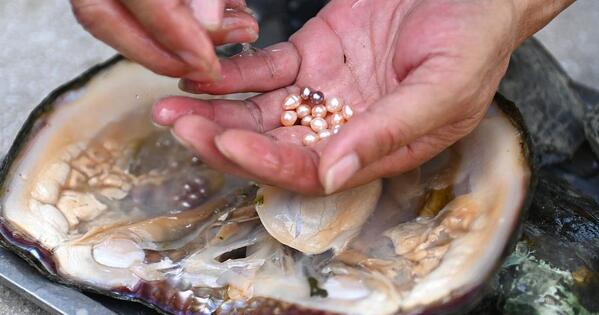Copyright beijingbulletin

HANGZHOU, Oct. 30 (Xinhua) -- In the small county-level city of Zhuji, east China's Zhejiang Province, two seemingly unrelated goods categories, pearls and socks, have not only thrived but achieved remarkable success, becoming two of China's most notable industries. The pearl town of Shanxiahu in Zhuji handles 80 percent of China's and 70 percent of the world's pearl transactions, while the "sock capital" of Zhuji's Datang Sub-district produces over 25 billion pairs of socks annually, enough to give every person on the planet three pairs each year. Rooted in traditional agricultural and textile manufacturing, both the pearl and sock industries in Zhuji have managed to stay relevant and grow into industry leaders over the years. Their success has been attributed to both rich displays of products through strategic exhibitions and high standards of quality inspection and technological innovation, industry insiders revealed. "Since the 1980s, pearl merchants have been purchasing goods from Shanxiahu. Although the locals got rich early by raising pearls, their success was somewhat hollow, as they were essentially building other people's brands," said Wang Yuefeng, head of Shanxiahu Township. "It was akin to making a wedding dress for someone else." Thanks to the continuous efforts of the local government, in 2008, the world's largest pearl trading market -- East China International Jewelry City, was put into use. This truly made the name Zhuji Shanxiahu Pearls well-known. Not only did the government bring the market to the doorsteps of locals, but it also enabled local enterprises to reach global markets. In March this year, for the 3rd consecutive year, the Zhuji municipal government organized a delegation of over 250 pearl enterprises to attend the Hong Kong International Jewelry Show, another effort in continuously expanding the international influence of Zhuji pearls and attracting more international jewelers to this city. The 5th Shanxiahu World Pearl Conference took place in May 2025, and it included a series of activities such as discussions regarding global pearl industry development trends and freshwater pearl farming technology innovation. All these initiatives aim to transform Shanxiahu from a freshwater pearl production base to a world-class pearl showroom, according to Wang. The success of the pearl industry has been mirrored in the local sock industry. Over the past three decades, Datang Sub-district has been hosting sock expos, which have drawn a constant stream of foreign trade orders and solidified its position as the world's sock factory. At present, Datang is home to the world's largest hosiery industrial cluster -- with an industrial scale exceeding 70 billion yuan (about 9.9 billion U.S. dollars). Tens of thousands of hosiery enterprises have formed a full industrial chain development advantage in Datang, ranging from product design to technological innovation. "In the international market, it has won a good reputation for its sock quality. Once foreigners recognize new products or designs, they must come to Datang for sampling," said Chai Jin, the Party secretary of Datang Sub-district. However, in this digital and tech-savvy era, these two industrial triumphs in Zhuji have also encountered their share of challenges. As dusk settled, the owners of the pearl stalls in East China International Jewelry City lowered their rolling shutters, turned on their beauty lights and live-streaming equipment, and launched into the "golden hours" of online sales to consumers on the other end of their phones. "Currently, online sales account for 60 to 70 percent of the entire pearl market, and cross-border e-commerce is also booming -- with sales exceeding 500 million yuan in 2024," said Yuan Xiaopeng, manager of the innovation and development division of East China International Jewelry City. Due to the limitation of e-commerce, a small pearl, embodying a significant price difference of up to a hundredfold between synthetic material and freshwater cultured, is hard for ordinary consumers to distinguish, Yuan revealed. "Selling fake pearls as real ones will damage the reputation of every Zhuji pearl merchant," said Zou Wei, a leading live-streamer on the Douyin platform, who has sold more than 1 million small-pearl necklaces. Notably, East China International Jewelry City has established a quality inspection and warehousing integrated operation center, requiring all jewelry sold through the Douyin platform to be inspected by a third party before shipping. This measure ensures fair competition for honest businesses and protects consumers. Similarly, the sock industry, facing changes in the international trade environment, has focused on quality and innovation. With thousands of patent applications each year -- covering equipment, materials and techniques, this industry continues to innovate and upgrade. "The more challenges and fierce competition we face, the more important it is to have strong product capabilities," said Zhou Dawei, general manager of Zhejiang Mianzhubu Technology Co., Ltd., a sock company that only sells basic plain cotton socks -- but which has been the top seller on the Tmall platform for three consecutive years. "New-material spinning may contain multiple patents, which fully shows the huge space for innovation and upgrading in the sock industry," said Hong Dongying, president of Zhuji's sock industry association.



